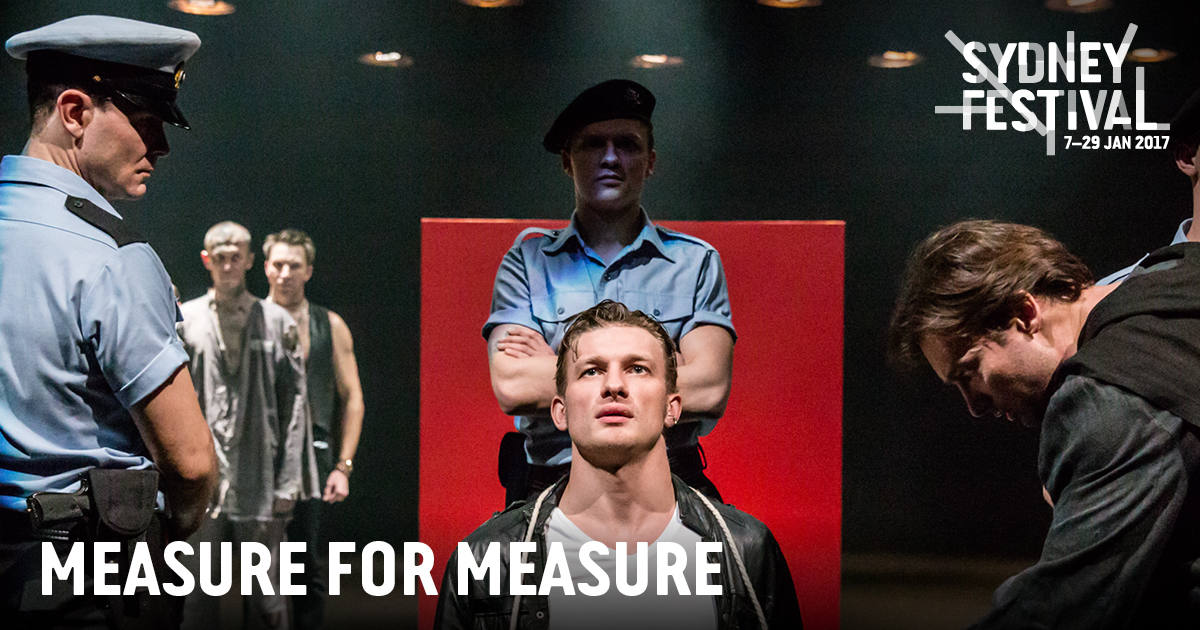We saw the Pushkin Theatre’s presentation of ‘Measure for Measure’ in Russian at the Sydney Festival. As homework, this inveterate student read the Folger Institute’s online version the morning before attending the evening performance. It helped a lot, having the major events and speeches in mind. The play had surtitles, which were easy to read, accurate to the play (as I recalled it from that morning’s reading), and also quick to keep pace with the action. Because I knew the play, I did not need to read every word of the surtitles, ignoring the players, to follow the action.
Originally classed as a comedy, ‘Measure for Measure’ is now canonised as a problem play. It is certainly serious as it touches on torture, rape, tyranny, hypocrisy, capital punishment, execution, and other problems that remain with us.
The Duke is tired of the responsibilities of office and curious to see what happens without him; off he goes on vacation, leaving Angelo in charge. Angelo is far more strict that the Duke, and becomes a scourge for Vienna. However, he is tempted to carnal knowledge by the beautiful and chaste Isabella. He will free her brother from prison and a death sentence if she will bed him. Her brother is guilty, by the way, of very same carnal knowledge of Juliet. The comic relief is provided by Lucio, a hanger on. There follow tricks and ruses in which everyone gets what they want, except Angelo, though he comes out of it pretty well. Most summaries refer to him as corrupt, and maybe he became corrupted, but he has a crisis of conscience at the beginning. He is no cardboard figure.

One might say the greater villain, if villain there must be, is the Duke himself who contrived the whole thing as an entertainment for his jaded eye. He manipulated the whole situation, and plays on the characters in Acts IV and V like puppets. At the end Lucio is sent to be hanged for slandering the Duke, whereas in this performance, which has edited the play down to 110 minutes, he is sent to be whipped.
The play is indeed the thing. The production was marvellous. Full of energy and light. It ran straight through with no interval which sustained the momentum and energy. An excellent approach. Changes of scene were marked by a swirl of the characters around the stage leaving upstage those in the next scene while the others retired to the position of a chorus looking on and occasionally reacting. The actors were on stage for the duration. Costume changes were effected behind the stage props, four red block that turned out to be….
We particularly like the first dance sequence between a blindfolded Angelo and Maria as Isabella. The bass playing makes sense after a few minutes.
There is a trailer on You Tube at
There are also some interviews with the producers and actors discussing the themes in the play.
It surely took some courage to include a Russian language production in a large theatre in the Sydney Festival. There must have been wise heads demurring all along the way. Too risky. Too outré. Too complicated. Too hard. Too…… too. No doubt I would have been one of them. Wrong. Chapeaux!
How easy it all was. I could command to the iPad screen the authoritative text of the play when I chose to do so. No trip to the library or bookstore to find all the copies gone. I printed the tickets at home so no queuing up. The surtitles worked perfectly to bridge the language barrier.
Moreover, we drove into the Rocks, parked at the front door of the theatre, ate a good dinner a few doors down the street, and walked back to the theatre for the show. To go home, it took fifteen minutes from leaving the theatre to entering the house. For that evening Sydney was like small town. The more so since we saw some people we know in the crowd.
Skip to content
